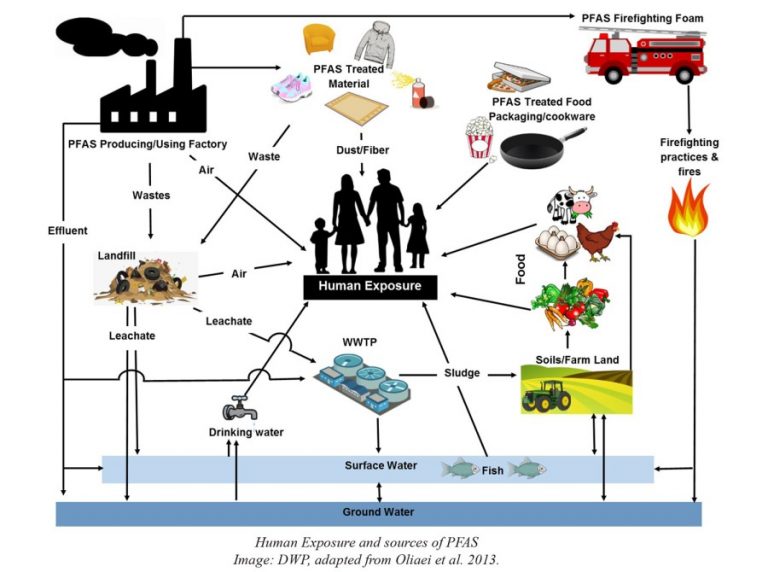PFAS Challenge with Innovative Treatment Solution
Published on by Water Network Research, Official research team of The Water Network in Business
Genesis Water Technologies Engages in PFAS Challenge with Innovative Treatment Solution


PFAS – Per and Polyfluoroalkyl substances is a family of synthetic industrial compounds that has been used in everything from cleaning products to waxes, water repellents to consumer products and firefighting foams. This family of nicknamed, “forever chemicals” has infiltrated water supplies across the world. The effects of exposure to these chemicals are only starting to become uncovered.
At this point, based on validated published research by the Environmental Working Group (EWG), a non-profit, non-partisan organization dedicated to environmental and human health, there are over 1398 sites in 49 states across the USA with PFAS contaminated water supplies.
The latest update of an interactive map by EWG and the Social Science Environmental Health Research Institute, at Northeastern University, documents publicly known PFAS pollution in public water systems, military bases, airports, industrial plants, landfill dumps, and firefighter training sites across the US.
In addition, it is not a surprise that 60,000 residents of Wilmington, NC and cities in Michigan, New Jersey, and New York to name a few, have been exposed to multiple harmful emerging contaminants of the PFAS family of chemicals in drinking water. These emerging contaminants are a byproduct of the expansion of manufacturing over the years. This family of compounds are believed to have contributed to forms of cancer within residents of these regions over several decades.
A Proposed Solution
One company has proposed a innovative solution to this problem, ultimately saving lives, and optimizing treatment costs. Genesis Water Technologies, a leader in specialized solutions for the global water treatment industry, has proposed a solution to the challenge plaguing these affected areas that has not been dealt with optimally. This specialized treatment solution integrates Advanced Oxidation prior to the current approach of granular activated carbon, resins, or membrane technology to reduce operating costs and meet the ever changing regulatory limits on emerging contaminants such as PFAS.
Innovative Advanced Oxidation Systems designed, engineered and supplied by Genesis Water Technologies (GWT) provide a cost-efficient solution to treat problematic pollutants in both drinking water and wastewater. These systems are a part of a specialized treatment process that can treat GenX, PFAS and other recalcitrant contaminants in water. More importantly, it’s a means to take a step forward in the right direction for the areas across the US and around the world that are suffering similar issues. After all, clean water should be a right, not a privilege.
By integrating an Advanced Oxidation System, GWT can neutralize or remove the toxic contaminants in the tainted water source. These modular systems are adaptable to both industrial and small/midsize municipal water treatment applications.
Genesis Water Technologies designs these innovative systems utilizing a specific integration of our patent pending specialized electrochemical processes including EOX. In this EOX process, we are able to create an abundance of extremely reactive oxygen species and hydroxyl radicals that can destroy a wide range of pathogens and emerging contaminants in the tainted drinking water or wastewater source that can be further treated by conventional granular activated carbon polishing filter systems or specific resin systems.
What is GenX?
GenX is a member of a group of man-made compounds called Per- and Polyfluoroalkyl substances (PFASs). These chemicals consist of carbon-fluorine bonds that have been used in a wide range of industrial applications and tend to resist decomposition in the environment.
GenX itself is a processing aid used to make high-performance polymers used in a variety of applications including cell phones, laptops, and non-stick cookware among other applications.
Dupont, which later spun Chemours off, began making GenX in 2009 after agreeing to a consent order with the EPA to replace PFOA, a harmful substance also known as C8. At the time, the company said GenX has “favorable toxicological profile” and is easier for humans to eliminate than C8. It was only during a meeting with Wilmington, NC areas officials that it was revealed the chemical was also created as a byproduct of a vinyl ether process occurring at the Wilmington, NC area plant.
There are no federal limits established yet for the PFAS family of chemicals, as it is an emerging contaminant. However, state regulations are changing rapidly as its effects on the environment and human health trigger stricter regulations. For instance, the N.C. Department of Health and Human Services has set a health goal of 140 parts per million currently and other states are instituting stricter regulations.
Media
Taxonomy
- Industrial Wastewater Treatment
- Industrial Water Treatment
- Water Treatment Solutions
- Industrial Water Treatment
- water treatment
- PFAS